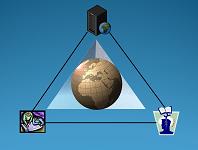 In today’s complex and interconnected world, the success of every business around the world depends on how it can effectively operate in collaborative mode: collaborative on global strategies and advantages, collaborative with governments and industries on joint global initiatives, collaborative on the intersections of sciences, technologies and engineering for cutting-edge innovations, collaborative to perform and solve tough problems with people of diverse skills across multiple locations, organizations, teams, etc.. The most practical operational unit for these collaborations is a global program or project. A business’ growth very much depends on the successful execution of these programs (typically include multiple inter-related projects or iterative projects with more breadth) and projects.
In today’s complex and interconnected world, the success of every business around the world depends on how it can effectively operate in collaborative mode: collaborative on global strategies and advantages, collaborative with governments and industries on joint global initiatives, collaborative on the intersections of sciences, technologies and engineering for cutting-edge innovations, collaborative to perform and solve tough problems with people of diverse skills across multiple locations, organizations, teams, etc.. The most practical operational unit for these collaborations is a global program or project. A business’ growth very much depends on the successful execution of these programs (typically include multiple inter-related projects or iterative projects with more breadth) and projects.
Not only are vertical chains of command and rank-and-file structures no longer sufficient to capture new opportunities or deal with organizations’ challenges, they are impractical or ineffective for global collaborations most of the time and for many reasons. Differences in culture, jurisdiction and standards can still be barriers for global businesses. Global projects, often more complex and challenging in nature than localized ones, are strategically important to most enterprises today. In the new business reality of ever-changing landscape of global innovations and competitions, as well as new market demands for quick learning, high adaptability, global perspectives and versatile skill-set, effective global program and project management skills, as a combination of mindsets, leadership skills and rigorous disciplines, which often times can only be trained and enhanced through years of real-world practices, are essential for both organizations and for each aspiring leader’s career.
Meg Whitman, the former CEO of eBay and current CEO of HP, in her autobiography ‘The Power of Many’, mentioned that “Project management skills are surprisingly rare in business, even though they are possibly the most important skills needed to be a good operating executive.” Alan Mulally, in his successful transformation of Ford, essentially adopted many of the sound principles of global project management to collaborate with Ford’s executive teams to lead and transform the aging company. For example, similar to the open communication principle and the collaborative techniques for leading a matrix environment in a project, he used the recurrent weekly Business Plan Review Meetings (BPRs) to gradually foster a positive culture change in a flattened organization and keep his global leadership team informed at all time, at the same time, on all aspects of the business. Running in comparison to a giant global program operation, he encouraged honest data-driven status reporting, joint planning and full leverages of the global strategies, platforms, resources across the company, emphasizing sharing and collaborations among all global top leaders and teams. These techniques proved substantially more efficacious and popular to transform an old business today than the command-and-control, abrupt changes or costly “new-boss restructuring” carried out in many of the business transformations of the past.
On an immensely flattened globe today, “going global” is no longer a slogan but an ever-present reality. Skills of leading and managing global projects cross-country, cross-industry and cross-group are more and more in high demands. Global projects are no longer limited to contracting out straightforward lines of tasks or responsibilities such as offshore development and testing in software development, or support offices for call centers. Increasingly global program and projects are set up for running large global efforts of joint marketing and sales initiatives, interdependent product/service R&D, supply-chain operations, strategic investments, joint ventures, choice placements of business segments and resources in multiple global markets, etc., to achieve the maximum levels of growth potentials, cost structures, performance or go-to-market efficacy.
It’s hard to summarize all the skills entailed for an effective Global Program or Project manager, but TriStrategist would list out a few core requirements for such a role:
- Essential Program and Project Management skills and experiences in diverse businesses or environments;
- Have broad-minded big-picture focus and global strategic views of the business; be able to balance the competing needs of the multi-factors of the global program or project in the framework of the big picture;
- Open-mindedness with a true appreciation and respect for cultural diversity;
- Great negotiation and communication skills;
- A willing leader who not only can lead people and projects, but can take calculated risks; be able to initiate tough decisions and win over global audiences to support the proposals or decisions for the long-term benefits of the business;
- A quick learner and “constant gardener”- willing to learn and adapt constantly.
Eventually all businesses need to proactively develop these skills and mindsets in their leaders and managers, or acquire these resources, but good and ready ones can be hard to find.
